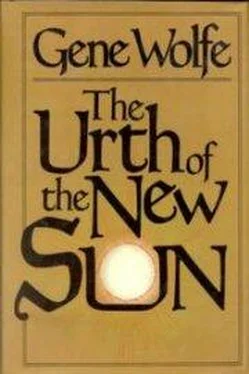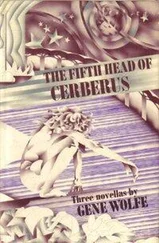At last she turned from me, and I from her. That was when I saw Agilus in the crowd, and Morwenna, with her black hair and branded cheeks.
With them were a hundred more, prisoners from our oubliette and the Vincula of Thrax, felons I had scourged for provincial magistrates and murderers I had killed for them. And a hundred more besides: Ascians, tall Idas, and grim-mouthed Casdoe with little Severian in her arms; Guasacht and Erblon with our green battle flag.
I bent my head, staring at the floor while I awaited the first question.
No questions came. Not for a very long time — if I were to write here how long that time seemed to me, or even how long it actually was, I would not be believed. Before anyone spoke, the sun was low in the bright sky of Yesod, and Night had put long, dark fingers across the isle.
With Night came another. I heard the scrabble of its claws on the stone floor, then a child’s voice: “Can’t we go now?” The alzabo had come, and its eyes burned in the blackness that had entered through the doorway of the Examination Chamber.
“Are you held here?” I asked. “It is not I who hold you.”
Hundreds of voices cried out, saying, “Yes, we are held!”
I knew then that they were not to question me, but I to question them. Still I hoped it might not be so. I said, “Then go.” But not one moved.
“What is it I must ask you?” I asked. There was no reply.
Night came indeed. Because that building was all of white stone, with an aperture at the summit of its soaring dome, I had scarcely realized it was unlit. As the horizon rose higher than the sun, the Examination Chamber grew as dark as those rooms the Increate builds beneath the boughs of great trees. The faces blurred and went out, like the flames of candles; only the eyes of the alzabo caught the fading light and shone like two red embers.
I heard the sailors whispering among themselves with fear in their voices, and the soft sighing of knife blades clearing well-oiled sheaths. I called to them that there was no reason to be afraid, that these were my ghosts, and not theirs.
The voice of the child Severa cried, “We’re not ghosts!” with childish scorn. The red eyes came closer, and again there was the scrape of terrible claws on the stone floor. All the rest fidgeted in their places, so that the chamber echoed with the rustlings of their garments.
I wrenched futilely at the manacles, then fumbled for the sliding link and shouted to Zak not to try to stop the alzabo without a weapon.
Gunnie called (for I recognized her voice), “She’s only a child, Severian.”
I answered, “She’s dead! The beast speaks through her.”
“She’s riding on its back. They’re here by me.”
My numb fingers had found the link, but I did not open it, knowing with a sudden certainty that could not be denied that if I were to free myself now and hide among the sailors, as I had planned, I would surely have failed.
“Justice!” I shouted to them. “I tried to act justly, and you know that! You may hate me, but can you say I harmed you without cause?”
A dark figure sprang up. Steel gleamed like the alzabo’s eyes. Zak sprang too, and I heard the clatter of the weapon as it struck the stone floor.
IN THE confusion I could not tell at first who had freed me. I only knew that they were two, one to either side, and that they took my arms when I was free and led me quickly around the Seat of Justice and down a narrow stair. Behind us was pandemonium, the sailors shouting and scuffling, the alzabo baying.
The stair was long and steep, but it had been constructed in line with the aperture at the apex of the dome; faint light spilled down it, the final glimmer of a twilight yet reflected from a scattering of cloud, though Yesod’s sun would appear no more until morning.
At the bottom we emerged into darkness so intense that I did not realize we were outdoors until I felt grass beneath my feet and wind on my cheek.
“Thank you,” I said. “But who are you?”
A few paces away, Apheta answered, “They are my friends. You saw them on the craft that brought you here from your ship.”
As she spoke, the two released me. I am tempted to write that they vanished at once, because that is how it seemed to me; but I do not think they did. Rather, perhaps, they walked away into the night without a word.
Apheta slipped her hand into mine as she had before. “I pledged myself to show you wonders.”
I drew her farther from the building. “I’m not ready to see wonders. Yours, or any other woman’s.”
She laughed. Nothing is more frequently false in women than their laughter, a merely social sound like the belching of autochthons at a feast; but it seemed to me that this laughter held real merriment.
“I mean what I say.” The aftermath of fear had left me weak and sweating, but the wild bewilderment I felt had little or nothing to do with that; and if I knew anything at all (though I was not certain I did), it was that I did not want to begin some casual amour.
“Then we will walk — away from this place you wish so much to leave — and talk together. This afternoon you had a great many questions.”
“I have none now,” I told her. “I must think.”
“Why, so must we all,” she said sweetly. “All the time, or nearly.”
We went down a long, white street that meandered like a river, so that its slope was never steep. Mansions of pale stone stood beside it like ghosts. Most were silent, but from some there came the sounds of revelry, the clink of glasses, strains of music, and the slap of dancing feet; never a human voice.
When we had passed several I said, “Your people don’t speak as we do. We would say they don’t speak at all.”
“Is that a question?”
“No, it’s an answer, an observation. When we were going into the Examination Chamber, you said you didn’t speak our tongue, nor I yours. No one speaks yours.”
“It was meant metaphorically,” she told me. “We have a means of communication. You do not use it, and we do not use the one you use.”
“You weave paradoxes to warn me,” I said, though my thoughts were elsewhere.
“Not at all. You communicate by sound, we by silence.”
“By gestures, you mean.”
“No, by silence. You make a sound with your larynx and shape it by the action of your palate and lips. You have been doing that for so long that you have almost forgotten you do it; but when you were very young you had to learn to do it, as each child born to your race must. We could do it too, if we wished. Listen.”
I listened and heard a soft gurgling that seemed to proceed not from her, but from the air beside her. It was as though some unseen mute had come to join us, and now made a croaking in his throat. “What was that?” I asked.
“Ah, you see, you have questions after all. What you heard was my voice. We call so, occasionally, when we are injured or in need of help.”
“I don’t understand,” I said. “Nor do I wish to. I must be alone with my thoughts.”
Between the mansions were many fountains and many trees, trees that seemed to me tall, strange, and lovely even in the darkness. The waters of the fountains were not perfumed as so many of ours were in the gardens of the House Absolute, but the scent of the pure water of Yesod was sweeter than any perfume.
Flowers grew there too, as I had seen when we had left the flier and as I was to see again in the morning. Most had now folded their hearts in the bowers of their petals, and only a pale moonvine blossomed, though there was no moon.
At last, the street ended at the cool sea. There the little boats of Yesod were moored, just as I had seen them from above. Many men and women were there too, men and women who went to and fro among the boats, and between the boats and the shore. Sometimes a boat put out into the dark, lapping water; and at times some new boat appeared, with sails of many colors I could scarcely make out. Only rarely was there a light.
Читать дальше










